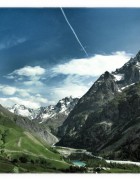The situation in Iraq remains complex and fluid.
Whilst media focus has shifted to Israel and Gaza, violence has continued in Iraq. ISIS appear to be consolidating their recent gains, with the government apparently unable to adequately respond. In the north, the Kurdish Peshmerga recently alleged the discovery of government plans to sabotage export facilities and as a result seized two oilfields from the North Oil Company: Kirkuk (250,000 bopd production) and Bai Hassan (<200,000 bopd). The de-facto tripartite break-up of Iraq continues.
With this in mind, a few maps may prove interesting:
The first is a map of Iraqi and Syrian cultural groups.
The second map adds oilfields and infrastructure to the above.
The majority of Iraq’s current ~3.5 million barrels per day production is from the Shia controlled south of the country, but it can be seen that the Kurdish region contains a significant oil field trend, including a number of giant fields. The map also illustrates a number of key refineries, including the 310,000 bpd Baiji refinery over which ISIS and Government troops have recently been fighting.
The final map shows the known progress of ISIS. It can be seen that the group remains in control of the Deir al Zour valley in Syria, including the limited oil production in that region. Their recent rapid advance in Iraq has the potential to add significant additional production. ISIS have almost gained the Baiji refinery, and local fields such as Hamrin (~2bnbbls). They have also recently attacked the Mansuriya gas field and the Akkas gas field (>5TCF).
As of July 2014 it’s estimated that ISIS could be raising as much as $1m a day from crude sales, including sales to their direct enemy combatant, the Syrian Army. However, their strategy may in fact be focused on a hearts and minds campaign. ISIS are selling refined products at a marked discount in their “conquered” areas, and are setting up diesel powered generators to provide electricity. This is in concert with a general socialised or even communist mentality, with which ISIS has set up health centres and subsidised / free bread provision. Thus, in a marked contrast to the failure of western troops to improve civilian lives in the aftermath of the 2nd Gulf War, ISIS are establishing an apparently effective civil infrastructure whilst providing a locally attractive anti-capitalist/anti-Western political narrative of “dignity”.
Meanwhile, in the south, a bilateral deal has been agreed between Basra’s governor Majid Nasrawi and the Iranian authorities to build a gas pipeline that will supply three new power plants, increasing ties within the Shia dominated region.
Amongst all of this, Baghdad dithers whilst Iraq burns. The Iraqi parliament finally managed to elect Salim al-Jabouri to Speaker of Parliament (“traditionally” a Sunni position). It must now choose a (“traditionally Kurdish) president within 30 days, before agreeing a (“traditionally” Shia) prime minister 15 days after that.
At this stage, it is hard to see Iraq remaining a unified state.




Pingback: Iraqi Government Restricts Electricity to ISIS Held Areas: Everyone who Knows Anything about Counter-Insurgency Smacks Forehead | Jordan Olmstead